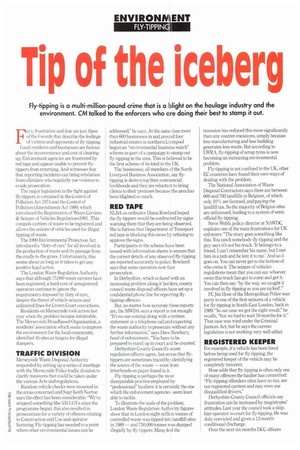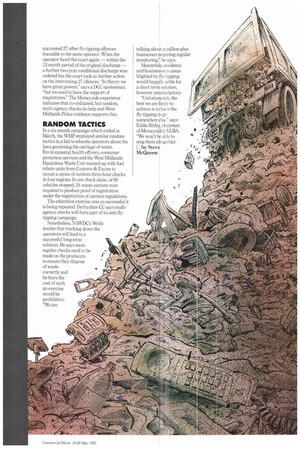Tip of the iceberg
Page 42

Page 43

If you've noticed an error in this article please click here to report it so we can fix it.
Fly-tipping is a multi-million-pound crime that is a )light on the haulage industry and the environment. CM talked to the enforcers who ore doing their best to stamp it out.
Fury, frustration and fear are just three of the f-words that describe the feelings of victims and opponents of fly-tipping. Local residents and businesses are furious about the inconvenience and cost of clearing up. Enforcement agencies are frustrated by red tape and appear unable to prevent flytippers from returning And witnesses fear that reporting incidents can bring retaliation from offenders who regularly use violence to evade prosecution.
The major legislation in the fight against fly-tippers is contained in the Control of Pollution Act 1974 and the Control of Pollution (Amendment) Act 1989, which introduced the Registration of Waste Carriers & Seizure of Vehicles Regulations1991. This compels carriers of waste to be registered and allows the seizure of vehicles used for illegal tipping of waste.
The 1990 Environmental Protection Act introduced a "duty of care" for all involved in the production of waste and its passage from the cradle to the grave. Unfortunately, this seems about as long as it takes to get any positive legal action.
The London Waste Regulation Authority says that although 75,000 waste carriers have been registered, a hard core of unregistered operators continue to ignore the requirements imposed by duty of care, despite the threat of vehicle seizure and unlimited fines for Crown Court convictions.
Residents on Merseyside took action last year when the problem became intolerable. The Merseyside Broadbased Organisation, a residents' association which seeks to improve the environment for the local community, identified 45 sites as targets for illegal dumpers.
TRAFFIC DIVISION
Merseyside Waste Disposal Authority responded by setting up a series of meetings with the Merseyside Police traffic division to clarify measures that could be taken under the various Acts and regulations.
Random vehicle checks were mounted in the areas concerned and Supt Keith Norton says the effect has been considerable: "We've stopped something like 550 LGVs since the programme began; this also resulted in prosecutions for a variety of offences relating to Construction and Use and operator licensing. Fly-tipping has receded to a point where other environmental issues can be addressed," he says. At the same time more than 600 businesses in and around four industrial estates in northern Liverpool began an "environmental business watch" scheme as part of a campaign to stamp out fly-tipping in the area. This is believed to be the first scheme of its kind in the UK.
The businesses, all members of the North Liverpool Business Association, say flytipping is destroying their commercial livelihoods and they are reluctant to bring clients to their premises because the area has been blighted so much.
RED TAPE
NLBA co-ordinator Diana Rowland hoped the fly-tippers would be confronted by signs warning them that they are being observed. She is furious that Department of Transport red tape is blocking this move by refusing to approve the signs.
Participants in the scheme have been issued with information sheets to ensure that the correct details of any observed fly-tipping are reported accurately to police. Rowland says that some operators now face prosecution.
In Derbyshire, which is faced with an increasing problem along it borders, county council waste disposal officers have set up a confidential phone line for reporting flytipping offences.
But, no matter how accurate these reports are, the MWDA says a report is not enough: "It's no use coming along with a written statement or a telephone call and expecting the waste authority to prosecute without any further information," says Dave Newbury, head of enforcement. "You have to be prepared to stand up in court and be counted.
Derbyshire County Council's waste regulation officers agree, but stress that flytippers are sometimes traced by identifying the source of the waste — even from letterheads on paper found in it.
Fly-tipping is perhaps the most disreputable practice employed by "professional" hauliers: it is certainly the one which the enforcement agencies seem least able to tackle.
To illustrate the scale of the problem, London Waste Regulation Authority figures show that in London eight million tonnes of controlled waste was tipped into landfill sites in 1989— and 750,000 tonnes was dumped illegally by fly-tippers. Many feel the recession has reduced this more significantly than any counter-measures, simply because less manufacturing and less building generates less waste. But according to LWRA, fly-tipping of scrap tyres is now becoming an increasing environmental problem.
Fly-tipping is not confined to the UK, other EC countries have found their own ways of dealing with the problem.
The National Association of Waste Disposal Contractors says there are between 600 and 700 landfills in Belgium, of which only 10% are licensed, and paying the landfill tax. So the majority of Belgian sites are unlicensed, leading to a system of semiofficial fly-tipping.
Steve Webb, policy director at NAWDC, explains one of the main frustrations for UK enforcers: "The story goes something like this. You catch somebody fly-tipping and the guy says it's not his truck. 'It belongs to a friend. I can't remember his name, but! met him in a pub and he lent it to me.' And so it goes on. You can never get to the bottom of who owns it. The seizure of vehicles regulations mean that you can say whoever owns this truck has got to come and get it. You can then say: 'by the way, we caught it involved in fly-tipping so you are nicked'."
PC Jim Hose of the Metropolitan Police was party to one of the first seizures of a vehicle for fly-tipping in South-East London, back in 1989: "In our case we got the right result," he recalls, "but we had to wait 18 months for it." That case was tried under the Criminal Justices Act, but he says the current legislation is not working very well either.
REGISTERED KEEPER
For example, if a vehicle has been hired before being used for fly-tipping, the registered keeper of the vehicle may be completely innocent.
Hose adds that fly-tipping is often only one of many offences the haulier has committed: "Fly-tipping offenders often have no tax, are not registered carriers and may even use disqualified drivers."
Derbyshire County Council officials say frustration can be increased by magistrates' attitudes. Last year the council took a skiphire operator to court for fly-tipping. He was duly convicted and given a 12-month conditional discharge.
Over the next six months DCC officers uncovered 27 other fly-tipping offences traceable to the same operator. When the operator faced the court again — within the 12-month period of the original discharge — a further two-year conditional discharge was ordered but the court took no further action on the intervening 27 offences. In theory we have great powers," says a DCC spokesman, but we need to have the support of magistrates" The Merseyside experience indicates that co-ordinated, but random, multi-agency checks do help and West Midlands Police evidence supports this.
RANDOM TACTICS
In a six-month campaign which ended in March, the WMP employed similar random tactics in a bid to educate operators about the laws governing the carriage of waste. Environmental health officers, consumer protection services and the West Midlands Hazardous Waste Unit teamed up with fuel rebate units from Customs & Excise to mount a series of random three-hour checks in four regions. In one check alone, of 69 vehicles stopped, 24 waste carriers were required to produce proof of registration under the registration of carriers regulations.
The education exercise was so successful it is being repeated Derbyshire CC says multiagency checks will form part of its anti-flytipping campaign.
Nonetheless, NAWDC's Webb doubts that tracking down the operators will lead to a successful long-term solution. He says more regular checks need to be made on the producers to ensure they dispose of waste correctly and he fears the cost of such an exercise would be prohibitive: "We are talking about a million-plus businesses requiring regular monitoring," he says.
Meanwhile, residents and businesses in areas blighted by fly-tipping would happily settle for a short-term solution, however unsatisfactory "Unfortunately, the best we are likely to achieve is to force the fly-tipping to go somewhere else," says Eddie Bibby, chairman of Merseyside's NLBA. "We won't be able to stop them altogether. I: by Steve McQueen
















































































